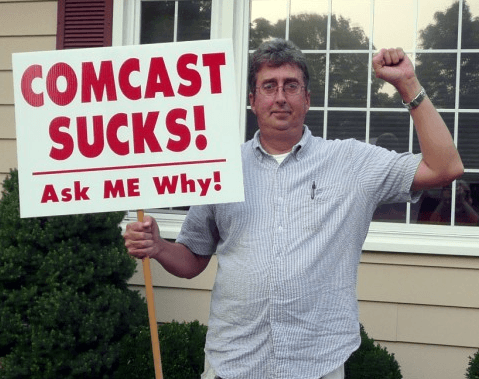 That paragon of virtue Comcast is back in the news again with yet another customer service horror story.
That paragon of virtue Comcast is back in the news again with yet another customer service horror story.
After Americans once again rated Comcast one of the most-hated corporation in America, employees are launching the equivalent of a “right back at you” retaliation campaign aimed at departing and downgrading customers with name-calling we cannot print on Stop the Cap!
It all started with Lisa Brown, a volunteer for a missions organization in Spokane, Wash., who told Elliot.org Comcast retaliated against her husband for daring to downsize his Comcast cable package. Brown said her husband’s name Ricardo was changed to “A**hole” on their bill. She tried in vain to get the unauthorized name change corrected, but nobody made things right in the local cable office or in Comcast’s executive customer relations department.
When a reporter called Comcast to confirm the profane name change, alarm bells rang as Comcast realized it had the latest PR Disaster of the Month on its hands.
Steve Kipp, Comcast’s vice president of communications in the Washington State region was shocked, shocked to discover customer service abuse was going on inside Comcast offices. He must not have worked there back in 2005 when the cable company called one woman a “b*tch dog” on her bill.
“We have spoken with our customer and apologized for this completely unacceptable and inappropriate name change,” Kipp told Elliot.org. “We have zero tolerance for this type of disrespectful behavior and are conducting a thorough investigation to determine what happened. We are working with our customer to make this right and will take appropriate steps to prevent this from happening again.”
Comcast eventually refunded back 24 months of cable service to the Brown family.
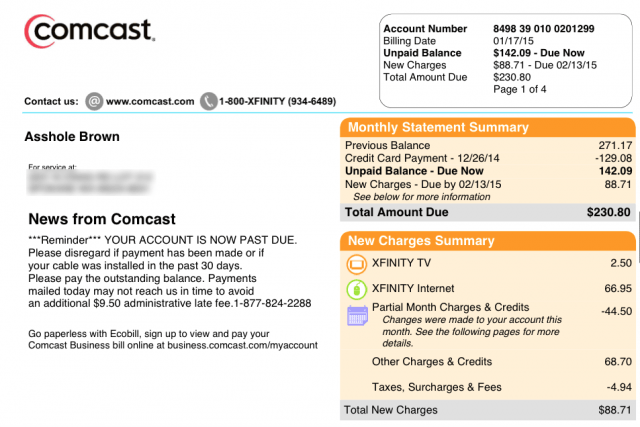
Notice Comcast charges a $9.50 “administrative late fee” on all accounts that are past due more than 10-14 days after the billing due date. Customers who do not clear their earlier balance to zero may be subject to this fee indefinitely with each billing statement.
Zero tolerance lasted about five minutes before more complaints began pouring in from other Comcast customers who have also been on the receiving end of Comcast’s wrath:
- One customer said a Comcast employee changed his name to the phonetic spelling of the “f word,” unprintable on this website;
- Julie Swano reported her December 2014 Comcast bill was addressed to “Whore” Julia Swano;
- Carolina Heredia: “They changed my name to ‘dummy’ on my online account, so that the greeting was ‘Hello, dummy,’” she said.
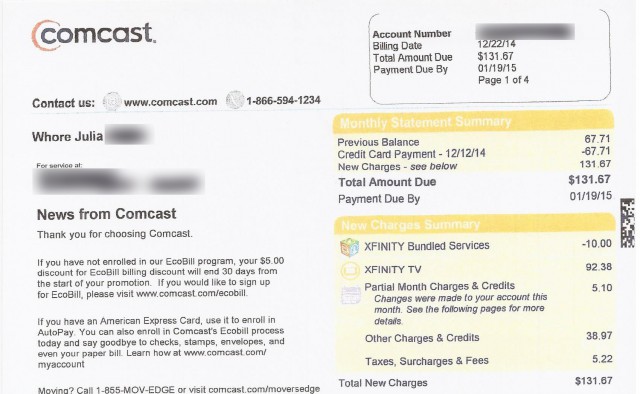
Notice Comcast customers who want a paper bill pay $5 more each month than those who accept eBills. Comcast customers complain “EcoBill” offers illusory savings, because for many the $5 “credit” was applied to bills that were also $5 higher than before. (Click image to read complaints)
Comcast’s Tom Karinshak, senior vice president of customer service, treated the incidents as some type of computer glitch or honest mistake.
“We’re retraining our teams on the importance of making name changes properly,” Karinshak said. “We’re looking for automated solutions to prevent this from happening in the future.”
“What amazed me then was that I had talked with at least 20 people at Comcast between Dec. 16 and Jan. 6 who could see that my name was ‘whore’ and they did nothing about it,” Swano said.
But once the matter went viral and could influence regulators contemplating Comcast’s buyout of Time Warner Cable, Comcast got serious enough to write about the incident on its blog.
“We have apologized to our customer for this unacceptable situation and addressed it directly with the employee who will no longer be working on behalf of Comcast,” wrote Charlie Herrin, senior vice president of customer experience.
Swano does not believe it is an isolated incident.
“I have no record of any recent contact with Comcast until Dec. 16. So whoever chose to re-name me picked my account out of a hat,” she said. “That says there are probably millions of us out there who Comcast employees have renamed. We need to find all of them.”
The American Customer Satisfaction Index pegged Time Warner Cable as the nation’s most unloved company in 2014, with its Internet service rated 236th out of 236 companies in customer satisfaction, and its TV service rated 235th. Comcast Corp.’s Xfinity Internet service placed 234th out of 236 and its TV service landed at 232 in the list released in May.
[flv]http://www.phillipdampier.com/video/CNN Another Comcast customer-service gaffe 2-1-15.flv[/flv]
CNN talks with the customer Comcast called an “a**hole” on their bill after the family dared to downgrade their cable service. (1:53)


 Subscribe
Subscribe Charter Cable customers in Mesa County, Col., experiencing the latest service outage from the cable company were told to “quit whining” and “check your attitude” when they called Charter’s customer service line to ask when the problems would be fixed.
Charter Cable customers in Mesa County, Col., experiencing the latest service outage from the cable company were told to “quit whining” and “check your attitude” when they called Charter’s customer service line to ask when the problems would be fixed. A county official calling to find out when repairs would be completed was told, “we have excellent service and do not appreciate your complaint for one incident of interruption of service.”
A county official calling to find out when repairs would be completed was told, “we have excellent service and do not appreciate your complaint for one incident of interruption of service.” Time Warner Cable was named by the Better Business Bureau’s its biggest overall offender in the Charlotte region, generating 187 complaints last year, according to the group’s annual year-end report,
Time Warner Cable was named by the Better Business Bureau’s its biggest overall offender in the Charlotte region, generating 187 complaints last year, according to the group’s annual year-end report, 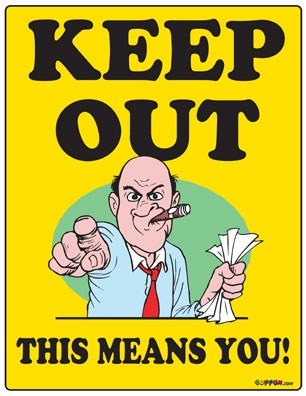 Verizon Communications has stepped up efforts in New York City to get intransigent landlords to let the company into their buildings to bring FiOS fiber optics to tenants, even as some property managers accuse Verizon of ignoring earlier requests to get the service.
Verizon Communications has stepped up efforts in New York City to get intransigent landlords to let the company into their buildings to bring FiOS fiber optics to tenants, even as some property managers accuse Verizon of ignoring earlier requests to get the service.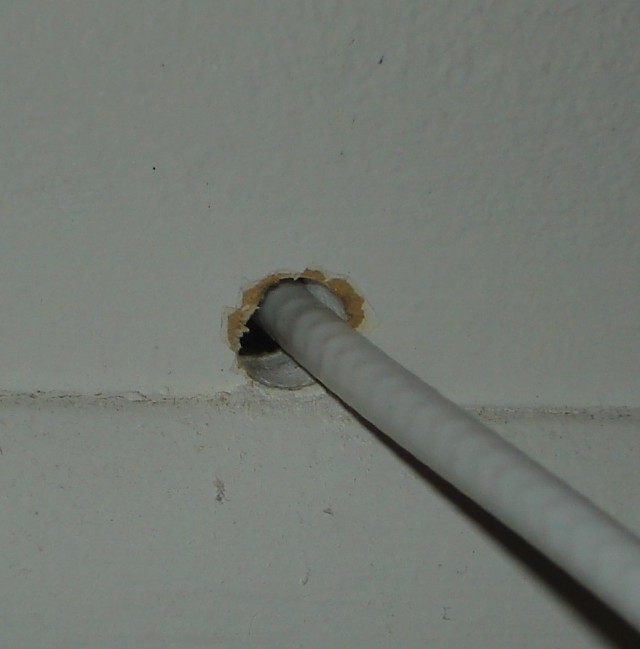
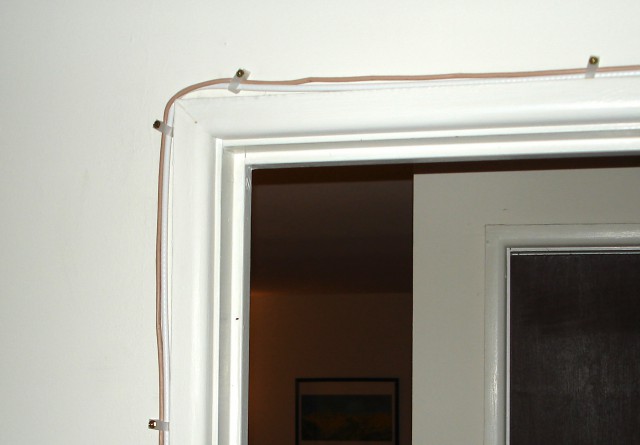
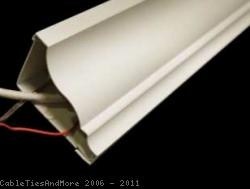
 AT&T has
AT&T has  AT&T calls the FTC’s claims it can intervene in services not regulated by the FCC “irrelevant,” arguing once one of AT&T’s services is subject to the FCC’s common carrier regulation, all of its services become untouchable by the FTC.
AT&T calls the FTC’s claims it can intervene in services not regulated by the FCC “irrelevant,” arguing once one of AT&T’s services is subject to the FCC’s common carrier regulation, all of its services become untouchable by the FTC.